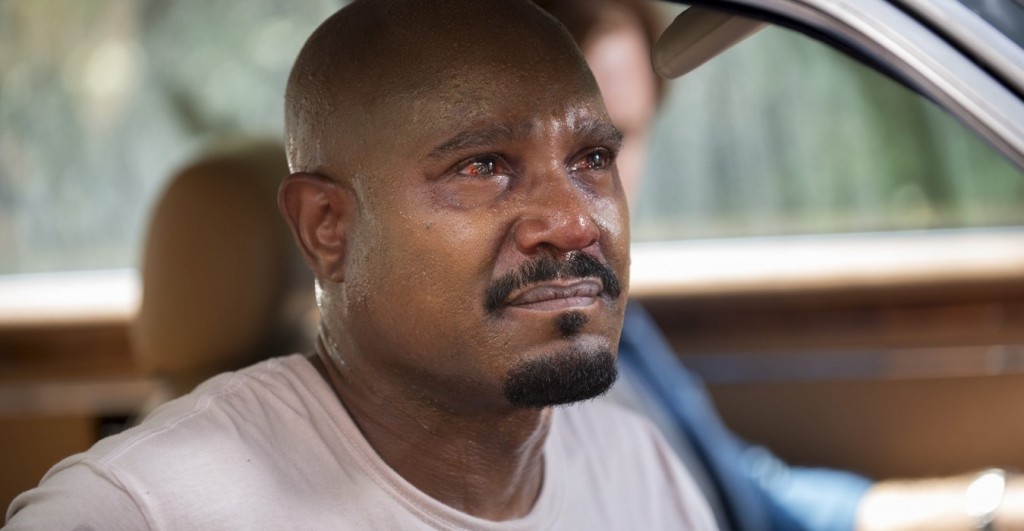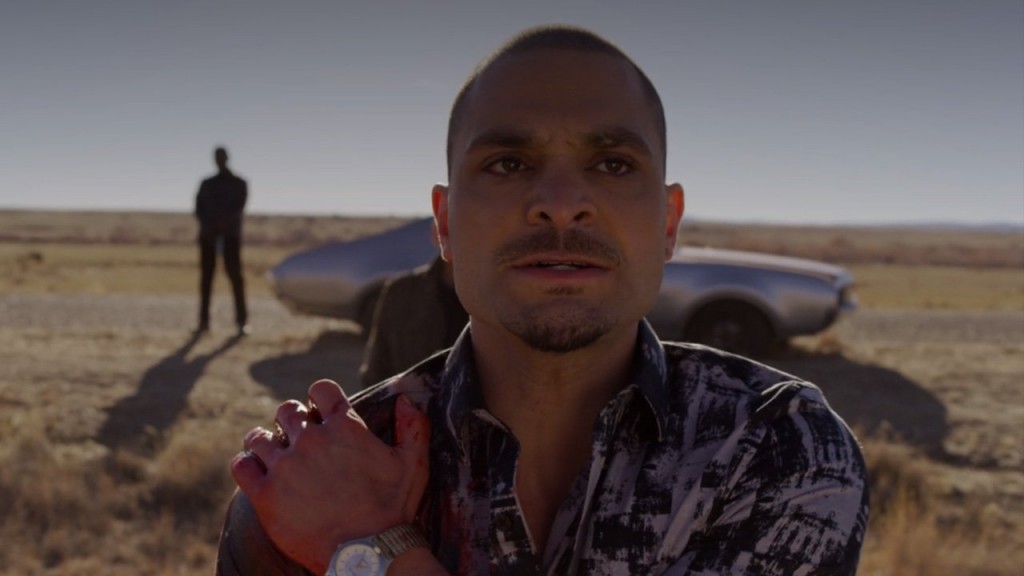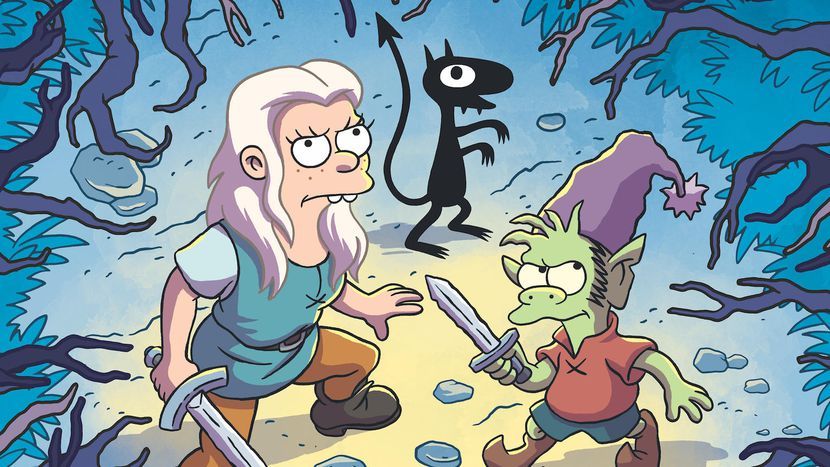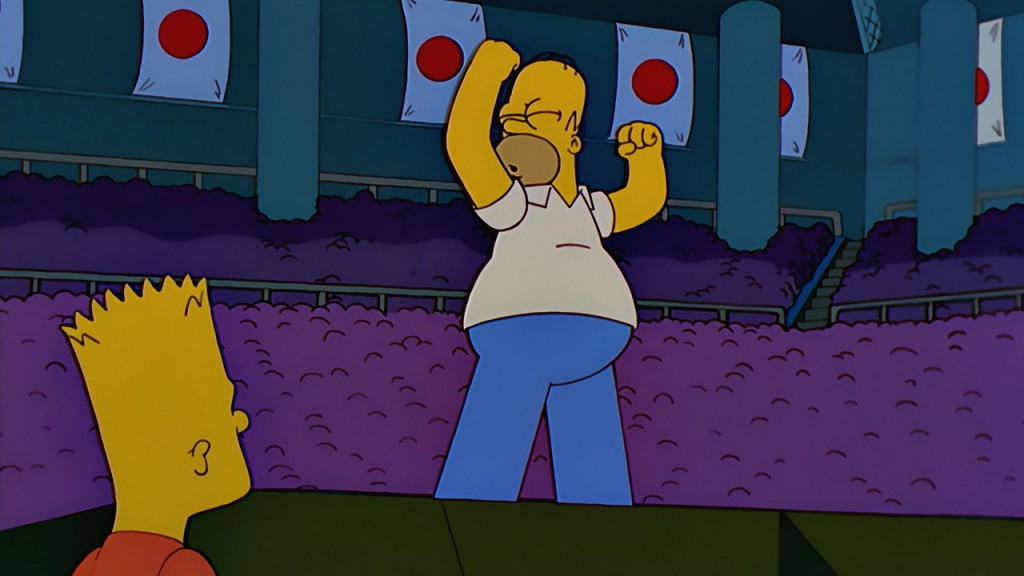-
Recent Posts
- Better Call Saul: There Are No Happy Endings between a “Rock and Hard Place”
- Black Widow Keeps It in the Family for Natasha’s Last Ride
- Loki Finds New Purpose in the Man behind the Mischief
- In its Debut, Star Wars: The Bad Batch Decides Whether to Obey or Rebel
- Nomadland: A Film Out of Time, For Our Times
Archives
Recent Comments
- Ed Clarke on Contact
- Matt on Why “The Frying Game” Is a Dark Horse Contender for The Simpsons’s Worst Episode Ever
- Lilly Dow on Contact
- Stacey on Veep’s Series Finale and the Hollowness of Getting What You Want
- Evan Jaocbs on Contact
Meta
Category Archives: Television
The Walking Dead Ponders Divine Intervention and Kindness in “Dead or Alive Or”
I like The Walking Dead when its episodes give us a series of vignettes much more than when it’s trying to pull off a single story that has umpteen tangled tentacles. That’s why Season 4 was such a high point for the show. Rather than weaving and unraveling scores of different characters, episode after episode, the show took time to let each of them have their own stories and gave their individual narratives the space to really breathe. That allowed the audience to get to know those characters and better appreciate their individual struggles and perspectives, rather than letting them be rolled up into the morass of dinge and lopsided plots that otherwise rumble through the series.
So my favorite parts of “Dead or Alive Or” are the interludes with Father Gabriel and Dr. Carson, because they feel like a throwback to those semi-standalone adventures from earlier in the series’s run. That duo’s portion of the episode doesn’t move the overarching plot forward much, but it serves as an illuminating short story in the midst of the larger, ever more tiresome narrative machinations of the Negan/Saviors arc.
Better Call Saul Veers Ever Closer to Breaking Bad in “Quite a Ride”
Better Call Saul has never been closer to Breaking Bad. That’s not just because this episode opens with this show’s first glimpse of our hero during the Walter White era. It’s not just because Gus Fring seems to nail down his plans for the facility that will one day become Heisenberg’s lab. And it’s not just because Jimmy visits The Dog House, the fast food restaurant and seedy hangout where Jesse Pinkman once sold his drug of choice.
It’s because “Quite a Ride” is about people who are almost peerless at what they do, unable to walk away from it, and the different directions those superlative skills take them. That was the larger story of Breaking Bad, a show devoted to a man who had an undeniable talent, but who could not let it go in the face of the money and long-awaited recognition he thought he was due, even when it came with a side of peril and human misery. Breaking Bad lived on the conflicted thrills of watching someone as talented as Walter White operate at the top of his game in a terrible industry, and earned its emotional resonance from the uncertain but foreboding sense of where those talents would lead him.
It’s Always Sunny in Philadelphia Finds Its Unsuspecting Heart with Kids

The most shocking thing from the season 12 finale of It’s Always Sunny in Philadelphia wasn’t that Dennis Reynolds, the venerable instigator of The Gang, seemed poised to leave Paddy’s Pub, and with it the show, forever. It was why he left.
Posted in Other Sitcoms, Television
Tagged Dennis Reynolds, Essays, It's Always Sunny in Philadelphia
Leave a comment
Better Call Saul Uses its Timeline to Show Us What’s Bothering Mike in “Talk”
Despite a few similarities (trunk shots for example), Better Call Saul rarely goes for the non-linear storytelling tricks that you might see in a Quentin Tarantino movie. Sure, you may get the periodic flash forward to Cinnabon Gene, or the occasional flashback to some illuminating incident from Jimmy McGill’s old life, but it’s rare that the show depicts the events of the present in something other than chronological order.
It’s noteworthy, then, that in this is episode, we see the end of Mike’s speech in group therapy before we see its beginning. The episode opens with a scene from his past, where Mike is meticulously laying down a slab of concrete and letting his son write his name in the wet cement. It’s a sweet moment, but one tinged with melancholy, and a dissonance when the episode then quickly cuts to Mike in the present, looking out at a stunned room and gruffly remarking that, hey, they wanted him to talk.
Better Call Saul: Nacho and Kim Are in Too Deep in “Something Beautiful”
The end of “Something Beautiful” makes me think of a scene from “Nailed”, the penultimate episode of Better Call Saul’s second season. In that episode, Chuck McGill confronted Kim and Jimmy about the suspected switcheroo with the Mesa Verde files. He impugned his brother’s character and told Kim to open her eyes, saying that Jimmy committed these misdeeds for her as part of a “twisted romantic gesture.”
But Kim defended Jimmy. She admitted that he’s not perfect, but argued that he was still a good person and someone she pitied in light of how much he ached for his brother’s love, a love that he would never get. She chastised Chuck for denying Jimmy that and for judging him, for threatening to inflict such consequences on him, and denied Chuck’s theory as crackpot. But then, when she was alone with Jimmy, she betrayed her true feelings. She punched Jimmy in the arm. She expressed her frustration, because she’s no fool; she knew he did it, and she thought that Chuck was right — that he did it for her.
Better Call Saul and the Choices We Don’t Have to Make in “Breathe”
One of the most interesting questions to ask — for both real people and characters on television — is why someone chooses to do things they don’t have to. The realities of life can push people toward certain choices, and circumstances often dictate actions. But there are situations in which there’s no external force, no rules or sticks or carrots to poke or prod, just a raw choice to be made. It’s these sorts of choices that can reveal who someone really is and what they’re going through, in a way that’s clearer than with choices that are muddied by pressure and inertia and need.
These are the types of questions that “Breathe” is interested in. Why is Gus Fring not only trying to keep Hector Salamanca alive, but also moving against those who tried to kill him? Why is Kim Wexler attending a meeting to determine Jimmy’s share of Chuck’s estate when Jimmy himself is blowing it off? Why is Mike Ehrmantraut determined to perform his “security consultant” routine on all of Madrigal’s outposts despite Lydia’s objections? And why is Jimmy McGill ready to talk himself out of a job, one he’d just hustled like crazy to earn?
Can Matt Groening Strike Gold for a Third Time with Disenchantment?
If all Matt Groening had ever done was create The Simpsons, one of the greatest television shows of all time, it would still have earned him a place in the pantheon of TV’s legendary creators. If all he had ever done was give life to Futurama, the cult classic sci-fi comedy that simply refuses to die, he would still have a claim to fame and have left an indelible mark on the small screen. But now Groening is about to unleash his newest creation, Disenchantment, another adult animated comedy, whose success or failure will determine whether Groening can carve out a place for this new series, distinguish it from its predecessors, and complete the TV show hat trick.
Posted in Other Animated Shows, Television
Tagged Disenchantment, Essays, Futurama, Matt Groening, The Simpsons
Leave a comment
Better Call Saul Leaves Its Audience to Wonder in “Smoke”

Jimmy McGill’s part in “Smoke” begins and ends with normalcy. In his first appearance in the episode, he gets up, feeds his fish, and makes coffee — the regular, mundane tasks of his new life. And in his last scene, he does the same things: joking about his fish’s appetite, tossing out coffee grounds, and seeming like a man very much returned to his routine.
Better Call Saul and the Last Line of Defense Between Jimmy McGill and Saul Goodman
Breaking Bad posited that who a person is, what kind of choices they make, is situational. Walter White always had Heisenberg within him: the arrogance, anger, and self-satisfaction. But that side of him, and the evil he would inflict, couldn’t emerge until his circumstances changed. When fenced in by a middle-class life with domestic responsibilities, Walt was a meek science teacher who wouldn’t, and maybe couldn’t, hurt a fly. It took a cancer diagnosis and a series of increasingly wild events to turn him into the vicious kingpin he eventually became and yet somehow always was. Breaking Bad suggested that this type of change in circumstances could reveal the real you and that your true nature is just one big bang away.
And yet Better Call Saul, through its own protagonist, presents a very different idea of who a person is and who they might become and what can restrain or expose that. There is a sense that Jimmy McGill’s true nature is irrepressible no matter his circumstances. Jimmy was born to con and manipulate and use his silver tongue to open doors, regardless of whether he’s a humble (if colorful) elder law attorney or the local TV huckster who becomes Walt’s conscience-free fixer in Breaking Bad. That part of him was always going to be there, rich or poor, success or failure, good or bad.
Posted in Better Call Saul, Television
Tagged Better Call Saul Season 3, Breaking Bad, Chuck McGill, Kim Wexler, Op-eds, Saul Goodman
Leave a comment
“Thirty Minutes Over Tokyo” and the Inscrutability of The Simpsons’ Fall From Grace
There’s a cottage industry devoted to trying to explain how and why The Simpsons fell from greatness. Every year or so, there’s a new YouTube video, or multi-part essay, or investigative deep dive that claims to have the answer for what made the show plummet from its perch as a pure television achievement to a series that became nigh-unrecognizable, both to casual audiences and the show’s biggest fans.
But as I discussed on The Simpsons Show Podcast, the truth is that there isn’t one answer to that question, let alone an easy answer. Everything from an exodus of talent, to a shift in the approach used to make the show, to the inevitable cracks that emerge in long-running series, contribute to the “why” part of it. And elements as varied as differences in the storytelling, technological changes in the animation, shifts in the characters’ personalities, and changing trends and norms in T.V. humor contribute to the “how” of it.








